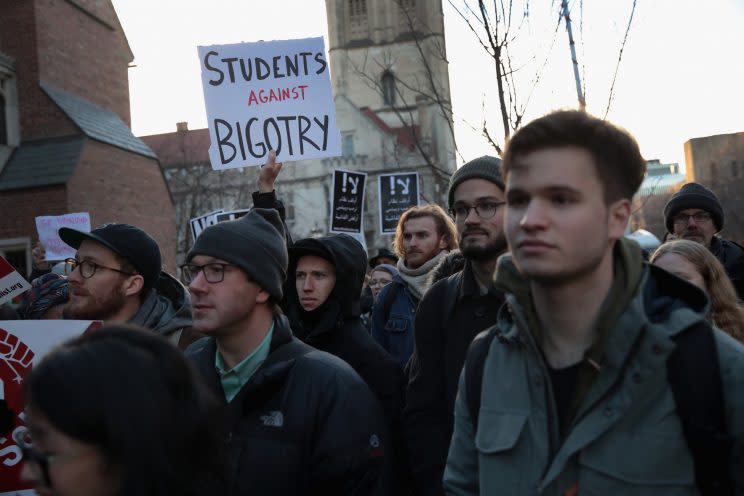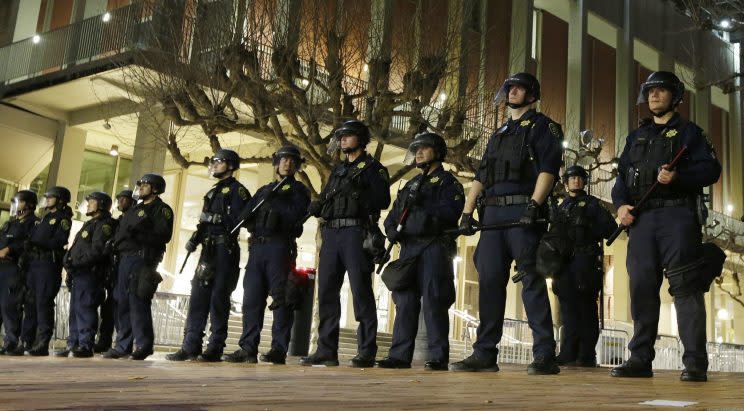Republicans increasingly think colleges are harming the U.S.
A new survey from the Pew Research Center finds that a majority of Republicans and Republican-leaning independents (58 percent) now think that colleges and universities are having a negative impact on the United States. That’s up from 45 percent last year.
For comparison, most Democrats and Democratic leaners (72 percent) think that institutions of higher learning are having a positive effect on the country, which is consistent with poll results from recent years.
Republican positions on colleges and universities changed drastically over a relatively short period.
Less than two years ago, in September 2015, 54 percent of Republicans thought colleges and universities were having a positive impact on the U.S. Only 37 percent thought otherwise. Last year, Republicans were split on the impact of these schools (43 percent positive versus 45 percent negative).
This is the first time a majority of Republicans expressed disapproval of higher education since the Pew Research Center started asking this question in 2010.
Between 2015 and 2017, Republicans with positive views of higher education’s impact on the nation dropped 18 percentage points, from 54 to 36 percent. The drop affected most demographic and ideological groups within the Republican Party. There was little change in opinion based on the level of educational achievement.

Large majorities of Democrats, on the other hand, viewed the impact of colleges on the U.S. positively, though there was a slightly higher percentage among those with more education.
It should come as no surprise to anyone reading contemporary conservative literature that Republican voters have issues with the current state of higher education. Attacks on free speech, political bias among professors and demonstrations seeking to cancel invitations to speakers with unpopular views have all become talking points among conservative pundits. Among the right, “safe spaces,” “trigger warnings” and “micro-aggressions” have become shorthand for thin-skinned liberal students who cannot handle opposing points of view.
The official 2016 Republican Party Platform outlines several of the GOP’s objections to American higher education. It says the excellence of the current university system is undermined by a “deeply entrenched” “ideological bias.”
According to the platform, trustees at state schools have a responsibility to taxpayers to ensure that their investment is not “abused for political indoctrination.”
“We call on state officials to preserve our public colleges, universities, and trade schools as places of learning and the exchange of ideas, not zones of intellectual intolerance or ‘safe zones,’ as if college students need protection from the free exchange of ideas,” it reads. “A student’s First Amendment rights do not end at the schoolhouse gates. Colleges, universities, and trade schools must not infringe on their freedom of speech and association in the name of political correctness.”
The Republican platform also condemns the “unsustainable trajectory” of rising tuition costs. Citing the crisis of student debt and college graduate underemployment, the platform calls on public policymakers to acknowledge that other options — such as technical institutions and online schools — may be preferable to traditional universities for some students.

The GOP opposes the federal government’s role in providing student loans and argues that this contributes to the problem of high prices.
For contrast, the official 2016 Democratic Party Platform does not mention political bias on college campuses and claims that a postsecondary degree is “increasingly required” for jobs that pay middle-class wages. Just like the Republicans, the Democrats express frustration with exorbitant tuition prices, but they offer different solutions.
The Democratic platform calls on schools to “hold the line” on costs while the federal government makes “bold new investments.” It also outlines its intentions to provide student debt relief, support universities that traditionally serve minority communities and crack down on “predatory for-profit schools.”
Robert L. Shibley, the executive director of the Foundation for Individual Rights in Education (FIRE), said Americans traditionally see universities as bastions of free speech and that schools are conspicuously failing to live up to this ideal, which is leading to a loss of confidence in those institutions.
“I think it’s because we saw that rash of incidents with conservative and libertarian speakers in the spring, it makes sense that people with those views or close to them would be quicker to lose confidence in whether or not colleges are serving their function and helping the country,” Shibley told Yahoo News.
In March, students at Middlebury College in Vermont successfully shut down a speech by controversial author Charles Murray. The University of California, Berkeley, canceled speeches by conservative firebrand Milo Yiannopoulos in February and right-wing pundit Ann Coulter in April following protests. The violent demonstrations against Yiannopoulos caused $100,000 in damage to the campus, catching national media attention.

Shibley said FIRE defends First Amendment rights on college campuses, which include free speech, freedom of religion, freedom of association and freedom of expression.
“Certainly we’ve been watching this growth recently in violent reactions to speakers coming on campuses,” he said. “And in some cases, like in Evergreen State, we’ve been concerned to see this growth in violent or intolerant reactions to people who dissent from the campus mainstream.”
It’s not just conservatives who take issue with the trend of silencing dissenting voices on college campuses.
In September 2015, then-President Barack Obama criticized liberals who “maybe even agree with me on a bunch of issues” but are not willing to listen to conservative voices. “I’ve heard of some college campuses where they don’t want to have a guest speaker who is too conservative. Or they don’t want to read a book if it has language that is offensive to African-Americans. Or somehow sends a demeaning signal towards women,” Obama said at a town hall in Des Moines, Iowa.
At the end of that school year, in May 2016, Obama rebuked students from the graduating class of Rutgers University in New Jersey for having successfully pressured former Secretary of State Condoleezza Rice to drop her scheduled commencement address at the school’s graduation two years earlier.
“I don’t think it’s a secret that I disagree with many of the policies of Dr. Rice and the previous administration. But the notion that this community or this country would be better served by not hearing a former secretary of state or not hearing what she had to say — I believe that’s misguided,” Obama told the graduates.
For the most recent survey, the Pew Research Center, a nonpartisan “fact tank” in Washington, D.C., polled 2,504 adults from June 8 to June 18. All participants were at least 18 years old. They came from all 50 states and Washington, D.C.
Among the survey’s other findings were that Democrats are more likely to have positive views of labor unions while Republicans are more likely to have positive views of churches and banks.
Democrats were mixed on the impact of the news media on the country (44 percent positive to 46 percent negative). Republicans have consistently shown a negative opinion of the news media, and this year was no different, 85 percent negative to 10 percent positive.
Read more from Yahoo News:
‘Had to listen’: Trump Jr. confirms meeting Russian lawyer to discuss Clinton
ISIS, driven out of Mosul, leaves behind a city in ruins and a society shattered by distrust
‘That is so illegal!’ Trump lashes out at Comey after report that memos may have been classified
Conway clashes with CNN’s Cuomo over Trump Jr.‘s Russian lawyer meeting



